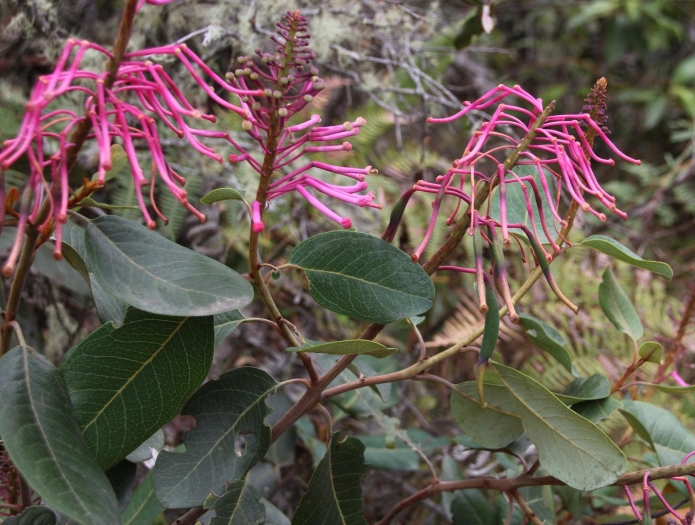Andean Firebush
(Oreocallis grandiflora)
Andean Firebush (Oreocallis grandiflora)
/
/

Tony Rebelo
CC BY-SA 4.0
Image By:
Tony Rebelo
Recorded By:
Copyright:
CC BY-SA 4.0
Copyright Notice:
Photo by: Tony Rebelo | License Type: CC BY-SA 4.0 | License URL: http://creativecommons.org/licenses/by-sa/4.0/ | Rights Holder: Tony Rebelo | Publisher: iNaturalist | Date Created: 41909 |

























Estimated Native Range
Summary
Oreocallis grandiflora, commonly known as the Andean Firebush, is a woody shrub or small tree in the Proteaceae family, native to the high-altitude Andean forests of Peru and Ecuador. It is typically found at elevations between 3937-12467 feet above sea level. This species is semi-deciduous to evergreen, depending on the local climate and altitude. Oreocallis grandiflora can reach up to 20 feet in height and is characterized by its variable leaves, which are arranged in a spiral pattern along the branches.
The Andean Firebush is notable for its striking inflorescences, which are 3-7 inches long and bear tubular flowers that can be white, pink, yellow, or red, with red being particularly adapted for bird pollination. The flowering season varies with elevation but generally occurs when conditions are most favorable for pollinator activity. The flowers are quite showy and attract hummingbirds, which are the primary pollinators. In cultivation, it is valued for its ornamental flowers and as a plant that can adapt to a range of mountainous garden settings. It requires well-drained soil, moderate water, and thrives in full sun to part shade. While not commonly cultivated, it can be used in specialized plantings that mimic its native high-altitude conditions. Potential problems include limited availability of plant material and a lack of information on disease resistance. It is also used locally for firewood, carpentry, and has medicinal applications. The seeds are a food source in southern Ecuador, indicating its potential for use in edible gardens or agroforestry systems.CC BY-SA 4.0
The Andean Firebush is notable for its striking inflorescences, which are 3-7 inches long and bear tubular flowers that can be white, pink, yellow, or red, with red being particularly adapted for bird pollination. The flowering season varies with elevation but generally occurs when conditions are most favorable for pollinator activity. The flowers are quite showy and attract hummingbirds, which are the primary pollinators. In cultivation, it is valued for its ornamental flowers and as a plant that can adapt to a range of mountainous garden settings. It requires well-drained soil, moderate water, and thrives in full sun to part shade. While not commonly cultivated, it can be used in specialized plantings that mimic its native high-altitude conditions. Potential problems include limited availability of plant material and a lack of information on disease resistance. It is also used locally for firewood, carpentry, and has medicinal applications. The seeds are a food source in southern Ecuador, indicating its potential for use in edible gardens or agroforestry systems.CC BY-SA 4.0
Plant Description
- Plant Type: Shrub, Tree
- Height: 10-20 feet
- Width: 8-15 feet
- Growth Rate: Moderate
- Flower Color: Cream, Pink, Purple
- Flowering Season: Spring
- Leaf Retention: Evergreen
Growth Requirements
- Sun: Full Sun, Part Shade
- Water: Medium
- Drainage: Medium
Common Uses
Bird Garden, Border Plant, Hummingbird Garden, Low Maintenance, Showy Flowers
Natural Habitat
Native to high-altitude Andean forests in Peru and Ecuador
Other Names
Common Names: Tall Andean Shrub
Scientific Names: , Oreocallis grandiflora, Catas grandiflora, Catas grandiflora, Embothrium emarginatum, Embothrium grandiflorum, Embothrium grandiflorum, Embothrium grandiflorum, Embothrium mucronatum, Embothrium mucronatum
GBIF Accepted Name: